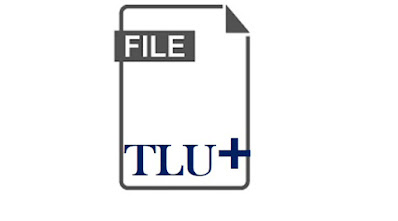Gate Level Netlist (GLN)
A design can be
represented into multiple formats and GLN is among them.
Once we are ready with
the design specification, RTL design writing functionality in HDL. After the
RTL verification of code, synthesizability of code is checked by the process
called as Linting and then code provides to the Synthesis team to generate
netlist.
Synthesis is the process
of converting RTL code into technology-specific Gate-Level Netlist by
translation, mapping and optimization process.
Gate-level Netlist
is a textual description of a design circuit. A netlist can also be a connection of transistor.
The netlist is then supposed to perform the same function as the corresponding
HDL code.
The netlist comes from the synthesis tool is then fed
into PNR tools to produce the layout of the chip. During this process, the
netlist might be modified but remains functionally equal to its corresponding RTL
code. The netlist then written by the PNR tool after the layout has been done is
often called post-layout-netlist. The noticeable difference between the
pre-layout-netlist and post-layout-netlist is the inclusion of 'clock
tree buffers' in the post-layout-netlist.
Sample of GLN is
below:
module counter ( clk, reset, enable, dat_out );
output [15:0] dat_out;
input clk, reset, enable;
wire N69, N70, N71, N72, N73, N74, N75, N76, N77, N78, N79, N80, N81, N82,N83, N84, N86, N88, N90, N92, N94, N96, n42, n43, n44, n45, n46, n47,n48, n49, n50, n51, n52, n53, n54, n55, n56, n57, n58, n59, n60, n61,n62, n63, n64, n65, n66, n67;
EDFFX2AD
\dat_out_sig_reg[0] ( .D(N69), .E(N96),
.CK(clk), .Q(dat_out[0])
);
EDFFX2AD
\dat_out_sig_reg[1] ( .D(N70), .E(N94),
.CK(clk), .Q(dat_out[1])
);
EDFFX2AD
\dat_out_sig_reg[2] ( .D(N71), .E(N92),
.CK(clk), .Q(dat_out[2])
);
EDFFX2AD
\dat_out_sig_reg[3] ( .D(N72), .E(N90),
.CK(clk), .Q(dat_out[3])
);
EDFFX2AD
\dat_out_sig_reg[4] ( .D(N73), .E(N88),
.CK(clk), .Q(dat_out[4])
);
EDFFX2AD
\dat_out_sig_reg[5] ( .D(N74), .E(N86),
.CK(clk), .Q(dat_out[5])
);
DFFQXLAD
\dat_out_sig_reg[8] ( .D(N77), .CK(clk),
.Q(dat_out[8]) );
DFFQXLAD
\dat_out_sig_reg[15] ( .D(N84),
.CK(clk), .Q(dat_out[15]) );
DFFQXLAD
\dat_out_sig_reg[6] ( .D(N75), .CK(clk),
.Q(dat_out[6]) );
DFFQXLAD
\dat_out_sig_reg[11] ( .D(N80),
.CK(clk), .Q(dat_out[11]) );
DFFQXLAD \dat_out_sig_reg[9] ( .D(N78), .CK(clk), .Q(dat_out[9]) );
DFFQXLAD
\dat_out_sig_reg[13] ( .D(N82),
.CK(clk), .Q(dat_out[13]) );
DFFQXLAD
\dat_out_sig_reg[14] ( .D(N83),
.CK(clk), .Q(dat_out[14]) );
DFFQXLAD
\dat_out_sig_reg[7] ( .D(N76), .CK(clk),
.Q(dat_out[7]) );
DFFQXLAD
\dat_out_sig_reg[10] ( .D(N79),
.CK(clk), .Q(dat_out[10]) );
DFFQXLAD
\dat_out_sig_reg[12] ( .D(N81),
.CK(clk), .Q(dat_out[12]) );
NAND2BX1AD U53 (
.AN(enable), .B(reset), .Y(N96) );
OAI2BB1X1AD U54 (
.A0N(dat_out[0]), .A1N(enable), .B0(reset), .Y(N94) );
INVX1AD U55 ( .A(n42),
.Y(N92) );
AOI31X1AD U56 (
.A0(dat_out[1]), .A1(dat_out[0]), .A2(enable), .B0(n43), .Y(
n42) );
NAND2X1AD U57 ( .A(reset),
.B(n44), .Y(N90) );
OAI2BB1X1AD U58 (
.A0N(n45), .A1N(dat_out[3]), .B0(reset), .Y(N88) );
NAND2X1AD U59 ( .A(reset),
.B(n46), .Y(N86) );
NOR2X1AD U60 ( .A(n47),
.B(n43), .Y(N84) );
XOR2X1AD U61 ( .A(n48),
.B(dat_out[15]), .Y(n47) );
NAND2BX1AD U62 ( .AN(n49),
.B(dat_out[14]), .Y(n48) );
NOR2X1AD U63 ( .A(n50),
.B(n43), .Y(N83) );
XOR2X1AD U64 ( .A(n49),
.B(dat_out[14]), .Y(n50) );
NAND3X1AD U65 (
.A(dat_out[12]), .B(n51), .C(dat_out[13]), .Y(n49) );
NOR2X1AD U66 ( .A(n52),
.B(n43), .Y(N82) );
XOR2X1AD U67 ( .A(n53),
.B(dat_out[13]), .Y(n52) );
NAND2X1AD U68 (
.A(dat_out[12]), .B(n51), .Y(n53) );
NOR2X1AD U69 ( .A(n54),
.B(n43), .Y(N81) );
XNOR2X1AD U70 (
.A(dat_out[12]), .B(n51), .Y(n54) );
NOR2BX1AD U71 (
.AN(dat_out[11]), .B(n55), .Y(n51) );
NOR2X1AD U72 ( .A(n56),
.B(n43), .Y(N80) );
XOR2X1AD U73 ( .A(n55),
.B(dat_out[11]), .Y(n56) );
NAND2X1AD U74 (
.A(dat_out[10]), .B(n57), .Y(n55) );
NOR2X1AD U75 ( .A(n58),
.B(n43), .Y(N79) );
XNOR2X1AD U76 (
.A(dat_out[10]), .B(n57), .Y(n58) );
NOR3BX1AD U77 (
.AN(dat_out[9]), .B(n59), .C(n60), .Y(n57) );
NOR2X1AD U78 ( .A(n61),
.B(n43), .Y(N78) );
XNOR2X1AD U79 (
.A(dat_out[9]), .B(n62), .Y(n61) );
NOR2X1AD U80 ( .A(n60),
.B(n59), .Y(n62) );
NOR2X1AD U81 ( .A(n63),
.B(n43), .Y(N77) );
XNOR2X1AD U82 ( .A(n60),
.B(n59), .Y(n63) );
INVX1AD U83 (
.A(dat_out[8]), .Y(n59) );
NAND2X1AD U84 (
.A(dat_out[7]), .B(n64), .Y(n60) );
NOR2X1AD U85 ( .A(n65),
.B(n43), .Y(N76) );
XNOR2X1AD U86 (
.A(dat_out[7]), .B(n64), .Y(n65) );
AND2X1AD U87 (
.A(dat_out[6]), .B(n66), .Y(n64) );
NOR2X1AD U88 ( .A(n67),
.B(n43), .Y(N75) );
XNOR2X1AD U89 ( .A(n66),
.B(dat_out[6]), .Y(n67) );
NOR2BX1AD U90 ( .AN(dat_out[5]),
.B(n46), .Y(n66) );
NAND3X1AD U91 (
.A(dat_out[3]), .B(n45), .C(dat_out[4]), .Y(n46) );
INVX1AD U92 ( .A(n44),
.Y(n45) );
NAND4X1AD U93 (
.A(dat_out[2]), .B(dat_out[1]), .C(enable), .D(dat_out[0]),
.Y(n44) );
NOR2X1AD U94 ( .A(dat_out[5]),
.B(n43), .Y(N74) );
NOR2X1AD U95 (
.A(dat_out[4]), .B(n43), .Y(N73) );
NOR2X1AD U96 (
.A(dat_out[3]), .B(n43), .Y(N72) );
NOR2X1AD U97 (
.A(dat_out[2]), .B(n43), .Y(N71) );
NOR2X1AD U98 (
.A(dat_out[1]), .B(n43), .Y(N70) );
NOR2X1AD U99 (
.A(dat_out[0]), .B(n43), .Y(N69) );
INVX1AD U100 ( .A(reset),
.Y(n43) );
endmodule
At this note of
discussion, we wrapped up this topic and we will meet soon with the new topic
of Design Setup. Thank you, Have a nice day!!



Comments
Post a Comment
If you any doubt, please let me know